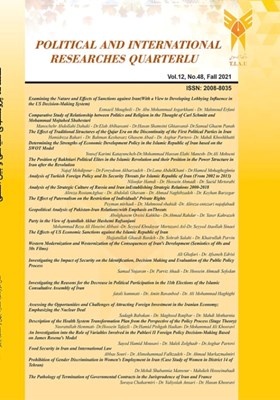An Investigation into the Role of Variables Involved in the Pahlavi II Foreign Policy Decision-Making Based on James Rosena’s Model
Subject Areas : Political and International Researches Quarterlysayed hamid mousavi 1 , Malek Zolghadr 2 , asghar partovi 3
1 - PhD Student in Political Science (Iran Issues), Faculty of Humanities, Zanjan Branch, Islamic Azad University,Zanjan, Iran
2 - Assistant Professor, Department of International Relations, Zanjan Branch, Islamic Azad University, Zanjan, Iran, Corresponding Author
3 - Assistant Professor, Department of Political Science, Faculty of Humanities, Zanjan Branch, Islamic Azad University, Zanjan, Iran
Keywords: Foreign policy, decision making, Second Pahlavi, Decision Making in Foreign Policy,
Abstract :
In order to explain the factors affecting foreign policy decision-making of Iran during the Pahlavi II period, the author examines the reasons for the adoption of some decisions in this period. According to James Rosena’s Model, the present research investigates five factors, namely, individual, role, government, social and international during the Pahlavi II period. In this regard, the four important and influential decisions of this period, namely de-escalation of tensions with the Soviet Union, the crisis in Bahrain and its transfer, Iran's behavior in the oil crisis of 1967 and 1973 and Iran's military action in Oman as indicators, selected, reviewed and the impact of each of the five variables discussed above are examined. According to the author, in this period, foreign policy decisions were influenced by cognitive elements and were generally made by the Shah himself. The cognitive system has been mainly influenced by the personality and temperaments of the Shah and in order to achieve the specific intellectual design of the person, among the variables involved, the individual variable and then the international system variable had the greatest impact on foreign policy decisions.
_||_


